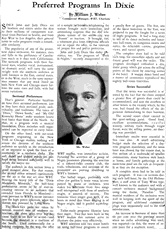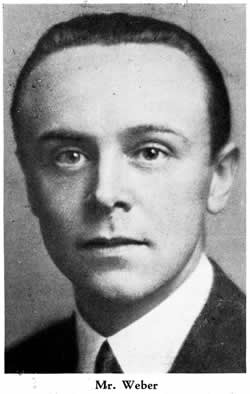


![]()
![]()
Since John and Judy Dixie are brothers and sisters under the skin to their millions of compatriots scattered from Portland to Seattle, and from Key West to Los Angeles, their general tastes in radio programs retain a remarkable similarity.
The popularity of any of the prominent dance orchestras, for instance, rises and falls in the preference of Carolinians much as it does with Californians. The network programs, with their featured stars, whether vocal, instrumental, or dramatic serial, will carry the same weight with the southern audience as with listeners in the East, central states, or in the West, much in the same mysterious manner that any stock listed on both New York and Chicago marts follows the same rises and falls, with but minor variations.
Sectional Preferences
That's general. Particular localities do have their sectional preferences, just as they have their sectional pride, individuality, and traditions. The tunes of "Dixie," "Down South," and "My Old Kentucky Home" make southern hearts beat faster than those of the North. So that, in a program with a musical foundation, Dixie melodies well represented can be expected to curry favor.
 On the other hand, with net-work programs originating in the New York or Chicago studios, nothing will arouse the derision of the southern audience so quickly as the introduction of an impostor to speak the lines of a southerner or a southern darky. The soft drawl, and slurred words are perhaps never imitated sufficiently well to satisfy the native ear.
On the other hand, with net-work programs originating in the New York or Chicago studios, nothing will arouse the derision of the southern audience so quickly as the introduction of an impostor to speak the lines of a southerner or a southern darky. The soft drawl, and slurred words are perhaps never imitated sufficiently well to satisfy the native ear.
The audience in this section loves a good minstrel show. For that reason, the second oldest minstrel continuously on the air is the star act over WBT. Bearing the heavy title of the "Dixie Mammoth Minstrels," the half-hour presentation seems to be of ever-increasing interest to an audience that extended from Florida to Maryland—even previous to WBT's recent entrance into the high power spectrum, when the station was powered by 5,000 watts.
The black-face parts are taken by veteran minstrel men of southern extraction; the show goes over big because there is no flaw in accent—and because the minstrel is a tradition of the South. Used commercially for a baking company, by the way, the offer of a sample to listeners telephoning the station brought such immediate and astonishing response that the dial telephone system of the entire city was "frozen" to inaction. It brought, too, a vehement plea from telephone officials not to repeat the offer, in the interests of proper fire and police protection.
John and Judy Dixie like darky dramatics, too. The program of "Dark K-Nights," recently inaugurated at the WBT studios, won immediate acclaim. Picturing the activities of a group of Negro promoters planning the erection of a colored-folks country club, the trials, tribulations, and successes of the promoters are proving absorbing to WBT's listeners.
The ballad singer, preferably with silver (or golden?) tenor voice, accompanied by, piano or orchestra, who makes his selections from love songs well interspersed with those of southern origin, is assured of success. The feminine blues singer goes well, if she bears in mind that blues singing is of Negro origin, and is guided accordingly.
Tailor-made programs likewise have their merit. Two that were built in the WBT studios this summer serve to illustrate the point very effectively.
WBT salesmen sold two resort hotels on using half-hour programs to assure a goodly flow of guests. The first, one of the finest hostelries in the East, was prepared to pay the freight for a series of night programs. It had a long story to tell of its dance orchestra and luxurious ball room, its sumptuous rooms and suites, its delectable cuisine, gorgeous views, and varied sports.
The complete story had to be told each time, for immediate results and not future good will was the order. The program developed embodied a dramatic group which got across the selling points of the client by enacting scenes at the hotel. A snappy dance band and a master of ceremonies reproduced the nightly ball-room festivities.
Series Successful
That the series was successful is attested by the fact that the client enjoyed a greater flow of guests than could be accommodated, and sent the overflow to other hotels in the vicinity which, by the way, had found the effects of the depression demoralizing to their business.
The second resort client catered to the quiet-seeking guest. Good food, excellent accommodations, restful scenery, solitary trails through virgin forest, were the selling points; no dancing was provided.
Immediate results were essential in this case also. A small advertising budget made the selection of a daytime program mandatory, and the noon hour was chosen for the reason that, in this section of a multitudes of smaller communities, many business men lunch at home, and family gatherings at the noon-time meal are the rule as frequently as they are the exception.
A complete story had to be told in each program. It was—in sections during each half-hour, by the Old Philosopher, a staff artist of Tony Wons type, well known to the audience and with a concert orchestra musical background — using the theme, "Paradise." The musical numbers of the orchestra were well in keeping with the spirit of the program, and additional commercial plugs were occasionally tied to the title introductions.
An increase in business of more than 60 per cent over the previous season when no radio advertising was used, was reported—in this, the worst of recent years for a southern resort.